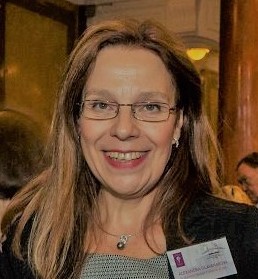
“New Modes of Reading Literature Online”
Abstract:
The subtitle of this talk is Literary Reading in the Age of Distraction. My aim is to initiate a discussion on reading literary texts online as a complicated process, which involves writing, and especially creative writing, mainly to investigate how the intertwining of the two can affect reading literacy. I will explore the boundaries of traditional literary study in the digital era, and what the benefits of utilizing digital tools in the teaching and studying of literature in higher education could be.
Reading habits change, as portable digital devices encourage us to browse, skim, tap, click, rather than read in depth; search for information, rather than go into deep reading of continuous prose, especially long-form texts as fiction. The online reading experience emphasizes speed and immediacy at the expense of the length, complexity and density of texts, which affects the “plastic reading circuit” (Wolf 2018). Reading onscreen emerges as the new normal, one in which memory and especially concentration are proving more challenging. Researchers and educators express the concern that these developments can stump the expert reading brain.
The main questions posited in reading research are: How does digital media, which help foster “continuous partial attention” (Stone 1998), decreased working memory (Baron 2015), multi-tasking, high levels of stimulation, low-level threshold for boredom, and the addiction to novelty, affect the reading process? How does this shift from page to screen affect literacy development and humanities research? What are, in particular, the repercussions of the new media ecology on the reading and study of literature in an academic environment? The most significant goal of research done in this area for me is to establish what specific training and what strategies of reading need to be applied in order to foster the bi-literate brain (Wolf 2018): one equally conversant in both digital tabular reading and long-form linear reading.
My interest in this area grows out of the real challenges I face every day in the literature seminar room in discussions of texts by American writers, when students come to class with the excuse “tl/dr”: too long / didn’t read. The questions posited here grow out of my own experience as a university professor doing a lot of reading – as a reviewer and editor of my own work for academic publications, as a colleague, as a teacher. My combined interests in American literature and culture on the one hand, and digital culture, on the other, despite being so diverse as subjects, eventually blended in what I teach and in how I teach it, and became also the focus of my critical inquiry.
My talk will build on research on new reading modes of fictional texts recently carried out by the national Reading Practices in Bulgaria Project (2018-2019) – The Online Reading Strategies Working Group, which I supervise, as well as on the findings of several cross-national European projects: ARFIS (2014-2017), E-READ (2014-2018), READ-IT (2018-2020). Significant contribution made by the work of American researchers in the field will also be incorporated: N. Katherine Hayles, Mark Algee-Hewitt, Jessica Pressman, Andrew Stauffer, Lisa Guernsey and Michael Levine, Naomi Baron, Marianne Wolf, to mention just a few.
Bio:
Alexandra Glavanakova, PhD: I am associate professor in American literature and culture at at the Department of English and American Studies at Sofia University “St. Kliment Ohridski”. My research fields are USA culture and literature; the major cultural shifts in literacy, education, literary studies, the creation and reception of texts under the impact of digital technology. I have been involved in a number of projects on e-learning and digital humanities, and teach courses in digital culture, multimodal writing and literature in the age of the Internet. My major publication in this field is Posthuman Transformations: Bodies and Texts in Cyberspace (2014). My other main areas of research and teaching are transcultural studies; immigration, race and ethnicity in the U.S.A. and Canada; the study of the Bulgarian Diaspora in the U.S. and Canada. My major publication in this field is Transcultural Imaginings. Translating the Other, Translating the Self in Narratives about Migration and Terrorism (2016).
